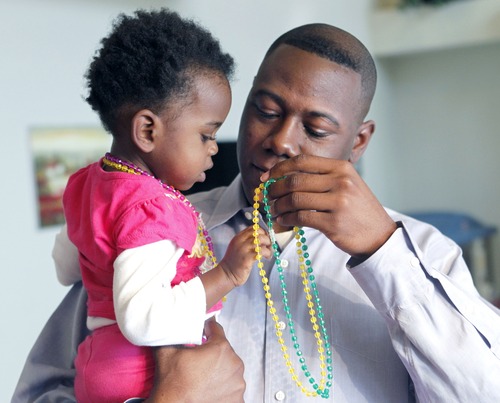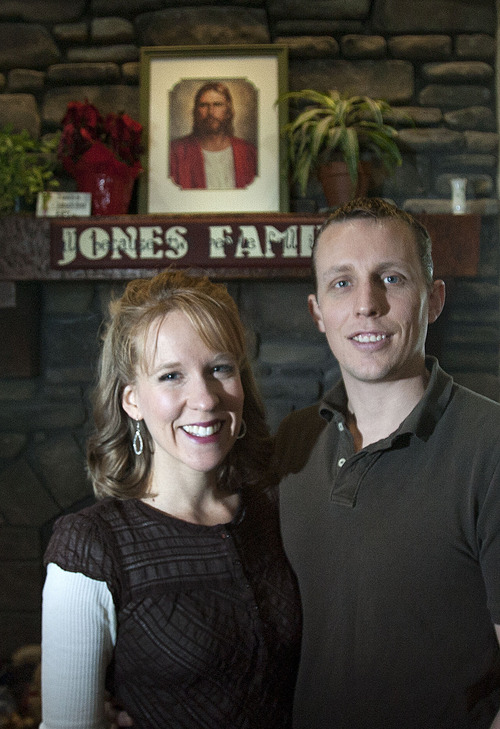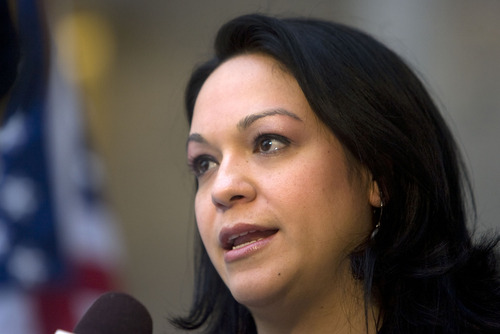This is an archived article that was published on sltrib.com in 2013, and information in the article may be outdated. It is provided only for personal research purposes and may not be reprinted.
One birth mom told the father of the child she placed for adoption in Utah that their baby died shortly after birth. Another claimed a trip to Utah was to visit a sick relative when in fact she traveled here to give birth and place the baby for adoption, while other birth mothers have falsely asserted a father is unknown or uninterested in a child.
In a "secret-shopper" style exercise in 2011, a Utah adoption attorney found representatives at three of four agencies were offering cash and coaching birth moms on how to mislead biological fathers to keep them from interfering in an adoption. Some prospective adoptive parents also have stepped forward to say they were given incomplete, misleading and even false information about biological parents of children they hoped to adopt — in some cases after spending thousands of dollars for placements that never materialized.
Utah law now specifically says fraudulent acts are no defense for an unmarried biological father's failure to protect his rights under the state's strict adoption statute and immunizes birth moms and agencies that engage in such practices, but a Utah lawmaker aims to change that this session by providing more recourse for biological fathers and prospective adoptive parents.
Sen. Luz Robles, D-Salt Lake City, will introduce SB183 during the Senate Judiciary Committee meeting Tuesday afternoon, a proposal that would create sanctions that could be imposed by the state Office of Licensing when an adoption agency or one of its employees makes fraudulent representations in connection with an adoption. Those sanctions could include denying, placing conditions on, suspending or revoking an agency's license.
It also directs courts to give more weight to due-process rights than bonding when a child is fraudulently placed with adoptive parents — as a 4th District judge recently did when he ordered Terry Achane's nearly 2-year-old daughter, placed at birth without the then-married father's knowledge, be returned to him.
The bill also would require the office to set minimum ethical standards for adoption agencies and allow a prevailing party to seek attorney fees and other costs.
Scott Wiser, who represented Achane in his successful legal fight, said the bill is "an excellent proposal to deter some of the deceptive tactics we've seen some birth mothers and private agencies resort to in order to cut otherwise fit, loving fathers out of their children's lives."
"An adoption done within legal and ethical parameters is a beautiful thing, but an adoption tainted by fraud becomes a nightmare for everyone involved," Wiser said. "Hopefully, the threat of monetary damages and licensing revocations will deter those who would otherwise be tempted to resort to deception to facilitate an adoption, and will provide recourse to birth fathers and would-be adoptive parents harmed because of a third-party's shenanigans."
Robles said she picked up the bill from Christine Watkins of Price, who ran a similar bill last year but lost re-election to her House seat.
"Most agencies are doing things correctly," Robles said. "But for some of them, there is evidence that the way they are providing services is not adequate."
Kevin Broderick, president of the Utah Adoption Council, said Monday the advocacy group had not yet settled on a position but members were raising "lots" of concerns about the bill, from its provision for payment of attorney fees to placing due-process rights ahead of a child's best interest and trying to define fraud — "especially when you have an unmarried mother who gives false information. It happens, but it's rare."
David McConkie, an adoption attorney, told The Salt Lake Tribune in a 2011 interview that agencies have to rely on truthfulness of birth mothers and "can't always control what the mother's going to do because we don't know what they are saying. We're not detectives, we can't figure all this out."
Wes Hutchins, an adoption attorney and president of the Utah Council of Ethical Adoption Practices (UCEAP), had his wife pose in 2011 as the sister of a pregnant woman who lived out-of-state and was considering adoption. In tape-recorded conversations with agency representatives, she was told ways to make it hard for a biological father to know about an adoption plan and thus to comply with Utah law in time to protect his rights.
In an email to lawmakers, Hutchins made a plea that they take steps to ensure "unethical and illegal adoptions don't continue in Utah." UCEAP voted unanimously to support the bill.
Utah's current adoption statute "has created an environment that encourages and even promotes illegal conduct," Hutchins wrote. "Ultimately, the end result is the destruction of one family, in a misguided and morally bankrupt effort to manufacture another. Most people do not understand, or believe it when you tell them, that fraud and even kidnapping have been legalized in Utah."
Joshua Peterman, an attorney who has represented numerous birth fathers in adoption disputes, called Robles' bill "a step in the right direction" but still puts the burden on a father to act even when fraud occurs.
"It still doesn't solve the problem of adoption agencies using fraud as a mechanism to facilitate adoptions," Peterman said. "I guarantee that there is not a single father who has lost a child to one of these rogue agencies who would agree that monetary damages are an adequate remedy. ... It is simply unconscionable that we have a system where a father who is ready and able to assume his role as a parent is prevented from doing so by an archaic statutory scheme, drafted by agency lobbyists, that makes it virtually impossible for him to do so."
He believes a more effective approach would be for lawmakers to get rid of the provision in Utah's adoption law that allows fraud.
Peterman added that the fraudulent conduct often impacts prospective parents as well.
"I have had instances where the adoptive parents have reached out to me following a case and provided information that the adoption agency had lied to them as well," he said. "It's all about money for some of these agencies."
What Utah's adoption law now says about fraud:
(d) The Legislature finds no practical way to remove all risk of fraud or misrepresentation in adoption proceedings, and has provided a method for absolute protection of an unmarried biological father's rights by compliance with the provisions of this chapter. In balancing the rights and interests of the state, and of all parties affected by fraud, specifically the child, the adoptive parents, and the unmarried biological father, the Legislature has determined that the unmarried biological father is in the best position to prevent or ameliorate the effects of fraud and that, therefore, the burden of fraud shall be borne by him. ...
... (1) Each parent of a child conceived or born outside of marriage is responsible for his or her own actions and is not excused from strict compliance with the provisions of this chapter based upon any action, statement, or omission of the other parent or third parties.
(2) Any person injured by fraudulent representations or actions in connection with an adoption is entitled to pursue civil or criminal penalties in accordance with existing law. A fraudulent representation is not a defense to strict compliance with the requirements of this chapter, and is not a basis for dismissal of a petition for adoption, vacation of an adoption decree, or an automatic grant of custody to the offended party. Custody determinations shall be based on the best interest of the child, in accordance with the provisions of Section 78B-6-133.







